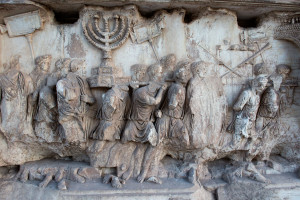 On the way he called at Jerusalem. There he contrasted the grievous desolation that met his eyes with the splendor of the city that was, and calling to mind the mighty structures in ruins now but once so beautiful… –Josephus, The Jewish War 8, 113
On the way he called at Jerusalem. There he contrasted the grievous desolation that met his eyes with the splendor of the city that was, and calling to mind the mighty structures in ruins now but once so beautiful… –Josephus, The Jewish War 8, 113
The First Jewish Revolt against Rome of 66-74 CE was a turning point in the history of the Jews and Judaism. The great debates about the place of Judaism in the Roman Empire were momentarily silenced by the war. The question facing the Jews was no longer how to live under Roman domination, but how to get out from under it. Those Jews who prided themselves on having “One Temple to the One God” found life under the Roman Empire unbearable. The incompetence of Roman governors and their unwillingness to accommodate the unique ways of Judaism, the influence of extreme anti-Romanism, and possible messianic and apocalyptic elements, led the Jews and Romans into the abyss of war in 66 CE. It is significant that the “symbol” for this break was the discontinuation of sacrifices on behalf of the Emperor in the Temple. While other nations had been required to sacrifice to the deified Emperor himself as the unifying god of the Empire, wise Roman administrators required that Jews only sacrifice to the God of Israel on behalf of the Emperor. With the outbreak of war, even this compromise broke down, and the protection of Israel’s God was withdrawn from the “evil empire.”
The great historian of the Jewish War was Joseph, son of Mattathias, a priest and Jewish general of the Galilee during the revolt. Josephus realized early in the war the futility of resistance, arguing that Judaea was doomed, owing to the excesses of Jewish fanaticism. He survived the war as court historian and propagandist for both the eventual Emperor, Vespasian, and his general, son and successor, Titus, championing a moderate Jewish voice. Thanks to the writings of Josephus, principally The Jewish War, scholars have considerable evidence of this conflagration at their disposal. For Vespasian and his sons, the Jewish War provided legitimacy to their rather shaky imperial dynasty. In defeating the Jews they restored the elusive Pax Romana, the “Roman Peace,” within the Empire. This war became the cause célèbre of the Flavians; memorialized in coinage (Judea Capta), monumental arches (of which only the Arch of Titus survives), a “Temple of Peace” that housed trophies of the war (most prominently the golden Menorah of the Temple), and the greatest stadium ever built, the Coliseum, built with funds taken from the Temple of the Jews.
The destruction of the Jerusalem Temple and desolation of Judaea wrought by the war had frightful effects upon Judaism, effects that reverberate to this day. The loss of the Temple left Judaism without its sacred center. Though anguish over the loss of the Temple overcame many, the desire to rebuild it came to permeate Jewish thought and ritual for the following two millennia. The variety of Jewish practices and beliefs that characterized the Second Temple period dissolved, as only two Jewish groups survived the destruction, the Jesus sect and the Pharisees. As a result, the destruction of Jerusalem had major implications for both the history of Judaism and Christianity. While the Jesus sect found its place in the non-Jewish world, the spiritual descendents of the Pharisees, now called Rabbis, began the reconstruction of Judaism. Building upon the popular prestige of the Pharisees, the Rabbis took on leadership roles and began to imagine ways to maintain Judaism in a world without the Temple. With this pivotal moment came the end of the Second Temple period, and on its ashes, the beginning of the age of the Rabbis.